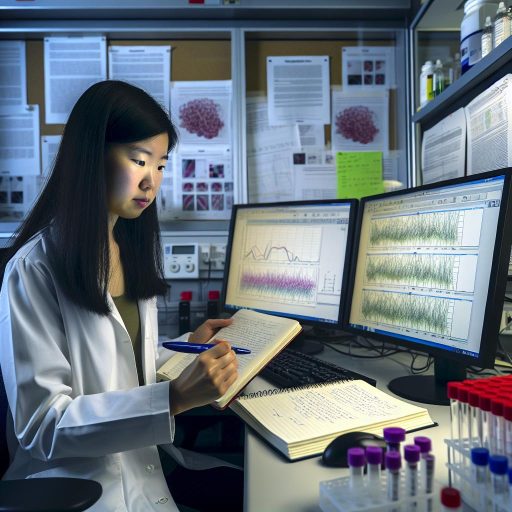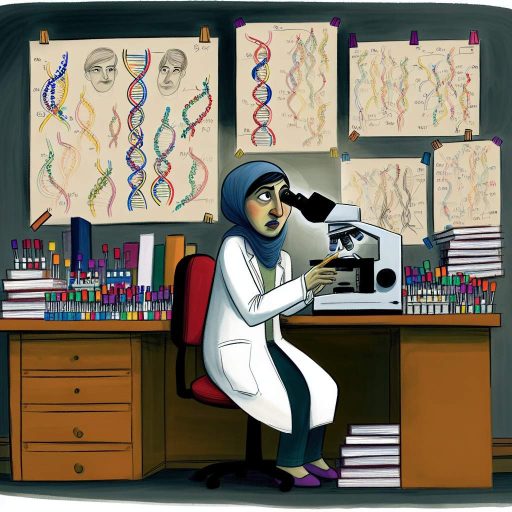Understanding the Basics of Genetics
Key Concepts in Genetics
Genetics is the study of genes and heredity.
Genes are units of heredity found in living organisms.
Understanding genes helps explain how traits are passed from parents to offspring.
Moreover, it’s essential to grasp DNA’s role in genetics.
DNA carries the genetic blueprint for all living things.
Each gene consists of sequences of nucleotides.
Nucleotides are the building blocks of DNA.
Consequently, variations in these sequences lead to different traits.
Fundamental Terminology
Familiarize yourself with important genetic terms.
Alleles are different forms of a gene.
Homozygous individuals carry two identical alleles.
Conversely, heterozygous individuals have two different alleles.
Phenotype refers to the observable characteristics of an organism.
Genotype represents the genetic makeup of an organism.
Understanding these terms is vital for any aspiring geneticist.
Inheritance Patterns
Genetic traits follow specific inheritance patterns.
These patterns include dominant and recessive inheritance.
In dominant inheritance, one allele masks the effect of another.
Recessive traits require two copies of the recessive allele to show.
Different patterns of inheritance, like codominance, exist.
Additionally, learn about polygenic inheritance for complex traits.
The Relevance of Genetic Diversity
Genetic diversity is crucial for the survival of species.
Diverse genotypes can enhance adaptability to changing environments.
Moreover, it plays a role in disease resistance.
Pools of genetic variation help ensure robust populations.
Unlock Your Career Potential
Visualize a clear path to success with our tailored Career Consulting service. Personalized insights in just 1-3 days.
Get StartedConsequently, conserving genetic diversity is essential in agriculture and conservation.
Tools and Techniques in Genetics
A variety of techniques are used in genetic research.
PCR, or polymerase chain reaction, amplifies DNA samples.
Sequencing technologies decode the order of nucleotides in DNA.
CRISPR technology allows for precise genetic modifications.
Familiarity with these tools will enhance your research capabilities.
Educational Pathways: Degrees and Certifications Required for Geneticists
Understanding the Field of Genetics
Genetics is a rapidly evolving scientific field.
It combines biology, chemistry, and technology.
Academics provide a foundation for aspiring geneticists.
Necessary Educational Qualifications
A bachelor’s degree is usually the first step.
Many aspiring geneticists major in biology or biochemistry.
This foundational knowledge is crucial for advanced study.
Some may also consider a degree in genetics itself.
Pursuing Advanced Degrees
A master’s degree can enhance career opportunities.
Students often specialize in a specific area of genetics.
Examples include molecular genetics or genetic counseling.
Additionally, a PhD is often required for research positions.
This advanced degree involves rigorous coursework and research.
Certifications and Licensing
Certification can demonstrate expertise and commitment.
Various organizations offer certification programs for geneticists.
For instance, the American Board of Genetic Counseling provides a certification.
This credential can improve job prospects significantly.
Continuing Education Requirements
Geneticists must stay updated with technological advancements.
Continuing education is often required for certification renewal.
Workshops, conferences, and courses help professionals stay informed.
Networking with peers also fosters ongoing learning.
Gaining Practical Experience
Internships and research opportunities are essential for skill development.
Many undergraduate programs offer these experiences.
Participating in labs can provide invaluable hands-on training.
Networking during these experiences can lead to job opportunities.
Skill Development
In addition to formal education, essential skills are necessary.
Critical thinking and problem-solving abilities are crucial.
Laboratory skills are also fundamental for geneticists.
Strong communication skills are needed to explain complex concepts.
Laboratory Skills: Essential Techniques Every Aspiring Geneticist Should Master
Understanding Basic Laboratory Techniques
Mastering basic laboratory techniques is crucial for geneticists.
Every geneticist should become proficient in pipetting.
Additionally, learning how to properly use microscopes is essential.
Handling samples with care helps ensure accurate results.
Furthermore, practicing sterility techniques prevents contamination.
Techniques for DNA Extraction
DNA extraction is a foundational skill in genetics.
Aspiring geneticists should familiarize themselves with various extraction methods.
Using kits simplifies the process but understanding organic methods is beneficial.
Moreover, mastering sequencing is vital for analyzing DNA.
Applying these techniques ensures reliable data for experiments.
Gene Cloning Methods
Gene cloning is a common practice in genetic research.
Understanding restriction enzymes and ligation is essential.
These concepts enable effective DNA manipulation.
Moreover, utilizing vectors is crucial for successful cloning.
Being well-versed in cloning techniques expands research capabilities.
Polymerase Chain Reaction (PCR)
PCR is a key technique for amplifying DNA.
Aspiring geneticists should understand the role of primers and enzymes in PCR.
Moreover, mastering the thermal cycling process ensures optimal results.
Practicing PCR enhances one’s ability to work with small DNA amounts.
This skill is widely used in various applications, from forensics to medicine.
Understanding Gel Electrophoresis
Gel electrophoresis allows geneticists to separate DNA fragments.
Learning to prepare and run agarose gels is important.
Additionally, understanding staining methods enhances visualization.
This technique is critical for analyzing the results of PCR.
Furthermore, accurate interpretation of gel results supports research findings.
Data Analysis and Bioinformatics
Data analysis is increasingly important in genetics.
Aspiring geneticists should become familiar with relevant software tools.
Learning bioinformatics enables the interpretation of complex datasets.
Additionally, understanding statistics aids in evaluating results.
These skills contribute to effective research and discovery.
Discover More: The Growing Demand for Geneticists in the Biotech Sector
Staying Current
Importance of Continuing Education
Continuing education is vital for aspiring geneticists.
The field of genetics evolves quickly, requiring constant learning.
Moreover, new research findings often emerge unexpectedly.
By staying updated, you enhance your expertise and knowledge.
This commitment can open doors for your career advancement.
Professional Development Opportunities
Seek diverse professional development opportunities.
Attend conferences hosted by organizations like the American Society of Human Genetics.
Participate in workshops that focus on new technologies.
Networking at these events can lead to valuable connections.
Joining professional organizations also provides access to resources.
Engaging with the Scientific Community
Engage with the scientific community regularly.
Read peer-reviewed journals to understand recent developments.
Participate in online forums and discussions about genetic research.
Consider collaborating with professionals in related fields.
This approach will broaden your perspective on ongoing research.
Staying Informed through Online Platforms
Leverage online learning platforms to stay informed.
Websites like Coursera and edX offer relevant courses.
Additionally, many organizations provide webinars on recent advancements.
Social media can also serve as a useful tool for updates.
Follow respected geneticists and institutions to gain insights.
Discover More: How Geneticists Contribute to Solving Global Health Issues
The Role of Technology in Genetics: Tools and Software Commonly Used
Introduction to Genetic Technology
Technology plays a crucial role in advancing genetics.
It enhances our ability to analyze and interpret genetic data.
Moreover, technological tools foster collaboration among geneticists.
Common Tools in Genetic Research
One essential tool in genetics is the DNA sequencer.
These devices read the sequences of DNA rapidly and accurately.
Next-generation sequencing (NGS) has revolutionized genomics.
It enables the sequencing of entire genomes efficiently.
Other Key Technologies
- Polymerase chain reaction (PCR) allows for DNA amplification.
- Bioinformatics software aids in data analysis and interpretation.
- CRISPR technology provides precise gene editing capabilities.
Software for Genetic Analysis
Geneticists often rely on specialized software for data analysis.
Open-source tools like Geneious facilitate various genomic analyses.
Additionally, commercial software such as CLC Genomics Workbench offers advanced features.
These tools streamline workflows and improve accuracy in research.
Bioinformatics Platforms
- UCSC Genome Browser provides a visualization of genomes.
- Ensembl offers comprehensive annotations for various species.
- Galaxy is an open-source platform for computational biology.
Integrating Technology into Daily Research
Aspiring geneticists should become proficient with these tools.
Regular practice can enhance familiarity and expertise.
This integration increases research efficiency and effectiveness.
Additionally, staying updated on emerging technologies is vital.
Networking and Collaboration
Participating in workshops or conferences can expand knowledge.
Networking with industry professionals leads to potential partnerships.
Collaborative projects often yield innovative solutions in genetics.
Explore Further: Impact of Ecologists on Conservation and Biodiversity

Networking and Collaboration
Building Professional Relationships in the Field
Networking is essential for aspiring geneticists.
It opens doors to new opportunities and collaborations.
Begin by attending conferences and seminars related to genetics.
Engage with industry leaders and fellow students.
Consider joining professional organizations like the Genetics Society.
These groups provide resources and networking events.
Volunteer for committees to gain visibility and connect with others.
Utilize social media platforms effectively.
LinkedIn, in particular, can foster professional relationships.
Share your research, achievements, and insights to attract interest.
Engage actively in discussions and groups focused on genetics.
Finding a Mentor
A mentor can guide your career and research path.
Look for someone whose work aligns with your interests.
Approach potential mentors during events or through email.
Be clear about what you hope to learn from them.
Build a mutual relationship based on respect and collaboration.
Regularly update them on your progress and seek feedback.
Collaborative Research Projects
Collaborating on research boosts your skills and network.
Identify labs working on topics that interest you.
Reach out and express your interest in their work.
Offer to assist with ongoing projects or propose joint initiatives.
Sharing diverse insights often leads to innovative ideas.
Utilizing Alumni Networks
Your university’s alumni network can be a goldmine.
Connect with alumni working in genetic research or related fields.
Ask for informational interviews to learn about their experiences.
Many alumni are willing to help students navigate their careers.
Stay in touch and update them on your progress.
Delve into the Subject: Exploring Wildlife Biologist Salaries in Canada
Ethical Considerations in Genetics
Moral Implications of Genetic Research
Genetic research raises significant ethical questions.
Researchers must consider the potential impact on individuals and communities.
Ethical dilemmas often arise in gene editing and manipulation.
Consent becomes a vital issue in any genetic study.
Participants must fully understand the implications of their involvement.
Regulatory Frameworks
International and national regulations guide genetic research practices.
These frameworks ensure ethical compliance and public safety.
Researchers must stay informed about changing regulations.
Collaboration with regulatory bodies fosters ethical research environments.
Privacy and Genetic Data
Privacy concerns about genetic data are paramount.
Data protection laws safeguard individuals’ genetic information.
Researchers must implement robust data security measures.
Transparency in data usage builds trust with study participants.
Implications of Genetic Technologies
Emerging genetic technologies can alter societal norms.
Potential consequences include genetic discrimination and stigmatization.
Researchers should actively engage in discussions about these implications.
Public awareness and education are crucial for ethical acceptance.
Future Directions
The future of genetic research hinges on ethical considerations.
Innovations must align with societal values and expectations.
Collaboration among scientists, ethicists, and the public is essential.
Ongoing dialogue can guide responsible development of genetic technologies.
Career Opportunities
Various Career Paths for Graduates in Genetics
Graduates in genetics can explore diverse career paths.
Many work in research laboratories, focusing on genetic analysis.
Some professionals join pharmaceutical companies for drug development.
Others find roles in agricultural industries, enhancing crop yields.
Additionally, genetic counselors provide guidance to patients.
Beyond direct employment, teaching positions in academia are common.
Research and Academia
Research positions often require advanced degrees.
Many researchers publish findings in scientific journals.
Collaboration with other scientists fosters innovation.
Postdoctoral fellowships provide additional training in specialized fields.
University faculty engage in teaching and mentoring students.
Pharmaceutical and Biotechnology Industries
Biotech companies seek geneticists for product development.
These roles may involve clinical trials and regulatory affairs.
Geneticists also work on gene therapy and precision medicine.
Collaboration with multidisciplinary teams enhances project outcomes.
Healthcare and Genetic Counseling
Genetic counselors assess risk factors for genetic disorders.
They help patients understand genetic testing results clearly.
Working in hospitals, they collaborate with medical teams.
Continued education ensures counselors stay current with advancements.
Agricultural Biotechnology
Agricultural genetics professionals focus on crop improvement.
They utilize genetic engineering to develop resistant strains.
Understanding environmental impacts is crucial in this field.
Partnerships with farmers can lead to practical applications.
Policy and Ethics
Some geneticists influence policy regarding genetic research.
These roles often involve advocacy and public engagement.
Addressing ethical considerations in genetics is paramount.
Collaboration with lawmakers shapes regulations affecting the field.
Additional Resources
How to Prepare a Competitive Application | Burnett School of …
Report of the Advisory Panel on the Federal Research Support System




